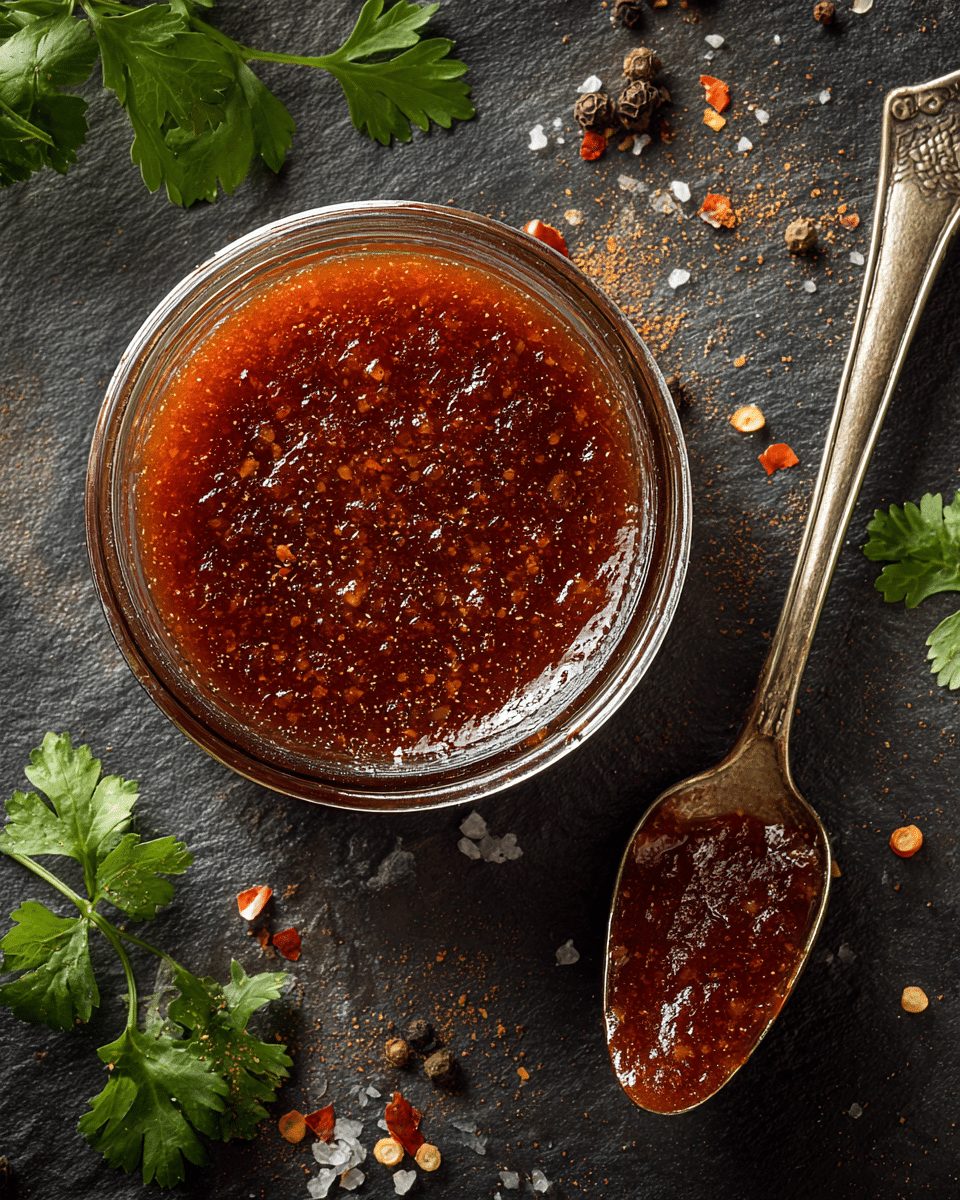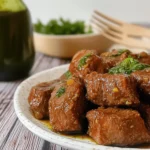North Carolina BBQ sauce is a tangy, vinegar-based condiment that’s a hallmark of Southern barbecue tradition. Unlike thick, tomato-heavy sauces from other regions, this style delivers a sharp, peppery kick that pairs perfectly with slow-cooked pulled pork, grilled chicken, and smoked meats.
FULL RECIPE
Ingredients
- 2 cups apple cider vinegar
- 1/2 cup ketchup
- 1/3 cup brown sugar, packed
- 1 tablespoon Worcestershire sauce
- 2 teaspoons red pepper flakes (adjust to taste)
- 1 teaspoon ground black pepper
- 1 teaspoon salt
- 1 teaspoon smoked paprika (optional for depth)
Directions
- Combine Ingredients – In a medium saucepan, add apple cider vinegar, ketchup, brown sugar, Worcestershire sauce, red pepper flakes, black pepper, salt, and smoked paprika (if using).
- Heat the Sauce – Place the saucepan over medium heat and whisk the mixture until the sugar dissolves completely.
- Simmer for Flavor – Reduce the heat to low and let the sauce simmer for 10–15 minutes, stirring occasionally, until slightly thickened.
- Cool and Store – Remove from heat and allow the sauce to cool to room temperature. Transfer to a glass jar or bottle and refrigerate until ready to use.
- Serve – Shake well before serving. Brush over meats during grilling or drizzle directly onto pulled pork sandwiches for authentic flavor.
Nutrition Facts
- Calories: 28
- Protein: 0g
- Fat: 0g
- Saturated Fat: 0g
- Carbohydrates: 7g
- Fiber: 0g
- Sugars: 6g
- Sodium: 240mg
- Vitamin C: 2% DV
- Calcium: 1% DV
- Iron: 1% DV
The Regional Identity of North Carolina BBQ Sauce
North Carolina BBQ sauce is more than just a condiment—it’s a culinary tradition deeply tied to the state’s barbecue culture. The eastern style is famous for its sharp, vinegar-heavy profile with minimal sweetness, while the western, or “Piedmont,” style blends vinegar with a touch of ketchup or tomato to add body and mild sweetness. This flavor distinction reflects the diverse history and local preferences across North Carolina. Its bright acidity cuts through rich, smoky meats, making it an essential part of authentic Southern barbecue celebrations, especially during summer gatherings like Labor Day.
Flavor Profile and Culinary Purpose
The magic of this sauce lies in its balance of tang, spice, and subtle sweetness. The vinegar base provides a bold, mouthwatering tang, while the addition of brown sugar and ketchup tempers the sharpness with a mild sweetness and depth. Red pepper flakes and black pepper add a gentle heat, making the sauce lively without overpowering the dish. Unlike thick, sticky sauces, North Carolina BBQ sauce is thin and pourable, designed to seep into meat fibers rather than coat them, creating a more integrated flavor experience.
Health Benefits of a Vinegar-Based Sauce
Vinegar-based barbecue sauces are generally lower in calories, sugar, and fat compared to creamier or heavily sweetened sauces. Apple cider vinegar, in particular, offers potential health benefits such as aiding digestion, supporting blood sugar regulation, and delivering a dose of antioxidants. The lower sugar content makes it a lighter choice for those monitoring carbohydrate intake, while the absence of oil or butter keeps it virtually fat-free. This makes North Carolina BBQ sauce a healthier alternative for flavoring grilled or smoked meats without compromising taste.
Key Role in Pulled Pork and Beyond
Traditionally, this sauce is paired with slow-cooked pulled pork, where its acidity cuts through the richness of the meat and enhances its smoky undertones. The sauce not only seasons the meat but also helps keep it moist during shredding and serving. Beyond pork, it complements grilled chicken, turkey, or even fish, offering a tangy contrast to lighter proteins. Some cooks also use it as a marinade, allowing the vinegar and spices to tenderize and infuse the meat before cooking.
Customizing the Heat and Sweetness
One of the advantages of making this sauce at home is the ability to tailor its flavor. For those who enjoy a spicier kick, adding extra red pepper flakes or a splash of hot sauce can intensify the heat. If a sweeter, milder profile is preferred, increasing the brown sugar or ketchup will soften the acidity. Smoked paprika can add a subtle smokiness without requiring a smoker, while mustard powder can introduce a tangy, sharp complexity reminiscent of South Carolina styles.
Pairing with Side Dishes
North Carolina BBQ sauce doesn’t just belong on meat—it can also enhance side dishes. Drizzling it over coleslaw creates a tangy-sweet version that pairs beautifully with barbecue plates. It can be tossed with roasted vegetables, mixed into baked beans for a zesty upgrade, or even used as a dressing base for potato salad. The vinegar-forward nature makes it especially refreshing alongside rich, creamy sides, balancing flavors and preventing the meal from feeling too heavy.
Using as a Finishing Sauce vs. Cooking Sauce
This sauce works differently depending on when it’s applied. As a finishing sauce, it’s drizzled over meat right before serving, delivering a bright punch of flavor and moisture. When used during cooking—especially in slow cookers or smokers—it infuses the meat with tanginess and helps tenderize tougher cuts. The thin consistency makes it ideal for basting, ensuring even distribution without creating a sticky glaze. However, because vinegar can evaporate under prolonged heat, some pitmasters reserve part of the sauce for a final splash before plating.
Shelf Life and Storage Tips
Thanks to its vinegar base, this sauce has a naturally long shelf life when stored properly. Kept in a sealed glass jar or bottle in the refrigerator, it can last for up to three months. For longer storage, it can be frozen in small portions and thawed as needed. If using as a picnic or outdoor cookout condiment, it’s best to keep the sauce in a cooler or shaded area to preserve its flavor and prevent spoilage, especially if fresh ingredients like garlic are included.
Adapting for Special Diets
This sauce is naturally gluten-free when made with gluten-free Worcestershire sauce, and it’s also vegan-friendly if the Worcestershire is substituted or omitted. For a sugar-free version, the brown sugar can be replaced with a natural sweetener like stevia or monk fruit. Those watching sodium can reduce the added salt and use a low-sodium ketchup. Its adaptability makes it suitable for a variety of dietary preferences, ensuring that everyone at the table can enjoy a flavorful barbecue experience.
Advertisement
Creative Uses Beyond BBQ
While its roots are firmly in barbecue tradition, this sauce can shine in other culinary contexts. It makes an excellent tangy salad dressing when whisked with a bit of olive oil, or it can be used to brighten up grain bowls, sandwiches, and wraps. Some home cooks use it as a dipping sauce for fries, hush puppies, or fried green tomatoes. Its acidity also makes it a great base for pickling vegetables, giving them a zesty Southern twist.
Conclusion
North Carolina BBQ sauce captures the essence of Southern cooking—simple ingredients, bold flavors, and a focus on enhancing rather than masking the taste of good meat. Its sharp vinegar bite, gentle heat, and subtle sweetness make it a refreshing alternative to heavy, sugary sauces. Beyond its traditional role in pulled pork, it’s a versatile condiment that works across proteins, sides, and even unconventional recipes.






